Savor the rich traditions of Arabic coffee in Saudi Arabia, where every cup tells a story of hospitality and heritage. Known as Al-Qahwa, this fragrant brew—infused with cardamom, saffron, and cloves—is more than a drink; it’s a symbol of generosity, served in delicate dallah pots during gatherings. From Bedouin tents in the desert to modern Riyadh cafés, discover how Saudi Arabia’s coffee culture blends ancient rituals with contemporary trends, like specialty roasteries and camel milk lattes. Whether you’re sipping in a historic majlis or a hip Jeddah coffee shop, experience the warmth of Saudi hospitality, one aromatic cup at a time.
Where Coffee Tells Stories of Hospitality
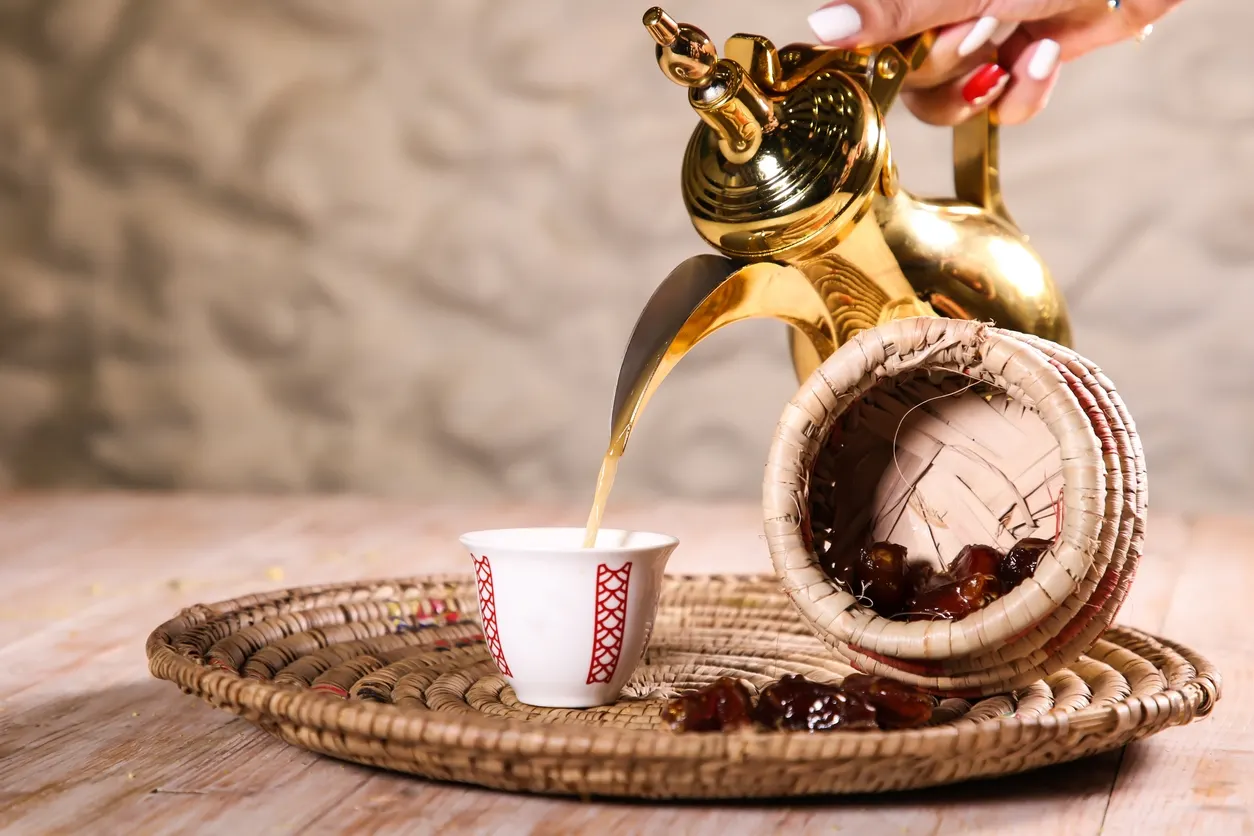
Coffee in Saudi Arabia tells a story that goes far beyond the bean itself—it's a centuries-old tradition woven into the very fabric of the nation's identity. In fact, the Arabic word "qahwa," from which "coffee" derives, means strength, reflecting its historical significance in providing energy and vitality to those who consume it.
The ritual of Arabic coffee in Saudi Arabia, known as Gahwa, stands as a powerful symbol of hospitality, especially within the majlis—a traditional seating area where stories are shared and connections flourish. Notably, UNESCO recognized this cultural treasure in 2022, registering Saudi Khawlani coffee and its associated knowledge to the List of Intangible Cultural Heritage of Humanity. During weddings, Eid celebrations, and other special occasions, coffee plays a central role, always served with dates to symbolize warmth and generosity.
As we explore the world of Saudi coffee traditions, Saudi Trip through the heart of the majlis, discover the intricate preparation rituals, and witness how this beverage transcends its role as a simple drink to become an essential expression of respect and celebration. From the mountainous growing regions of Jazan, AlBaha, and Abha to the modern cafés blending tradition with contemporary trends, coffee continues to unite generations through shared customs and evolving practices.
The Majlis: Heart of Saudi Hospitality
The traditional majlis stands as the cornerstone of Saudi hospitality, a concept that runs deeper than mere architecture. At its essence, the majlis represents a cultural institution where communities form, grow, and nurture relationships through meaningful interactions.
What is a majlis?
The term "majlis" literally translates to "sitting place" in Arabic, originating from pre-Islamic Arabia where it referred to a council of tribal men presided over by the Sheik. Historically, these were tented meeting spaces where Arabian hospitality was offered ahead of negotiations and business dealings since the ancient Silk Route era. Today, the majlis has evolved while maintaining its cultural significance—a space where both friends and strangers are welcomed with equal warmth, reflecting the profound Arabian value of hospitality.
In 2015, the majlis was jointly inscribed on UNESCO's Representative List of Intangible Cultural Heritage of Humanity by Saudi Arabia and several Gulf countries, acknowledging its cultural importance beyond national borders.

Why it matters in Saudi homes
More than just a room, the majlis embodies the very soul of Arab community life. This space serves multiple vital functions:
- A gathering place for discussing local issues and exchanging news
- A venue for resolving disputes and making collective decisions
- A setting for celebrating weddings and paying condolences
- A center for transferring oral heritage, including folk stories and poetry
Perhaps most importantly, the majlis acts as an educational environment where children learn cultural values by observing their elders. Through majlis participation, younger generations absorb proper manners, dialog skills, and respect for others' opinions—ensuring cultural continuity across generations.
How the space is arranged and used
A traditional majlis is typically the largest room in an Arab house with a separate entryway and larger entrance door. Inside, you'll find a spacious area with carpets covering the floor and cushions arranged against the walls. Low seating is preferred, allowing guests to sit comfortably with folded legs during extended conversations.
At the heart of many majlis is a special stove or "kawar" for preparing fresh Arabic coffee (gahwa). This setup reflects coffee's central role in Saudi hospitality rituals. Additionally, an incense burner called "mabkhara" is considered essential, diffusing pleasant aromas like oud or sandalum to create a welcoming atmosphere.
While modern influences have introduced contemporary design elements, the fundamental purpose remains unchanged. Arabs believe preserving these traditions is more crucial than ever—the lessons of conversation and human connection never becoming obsolete.
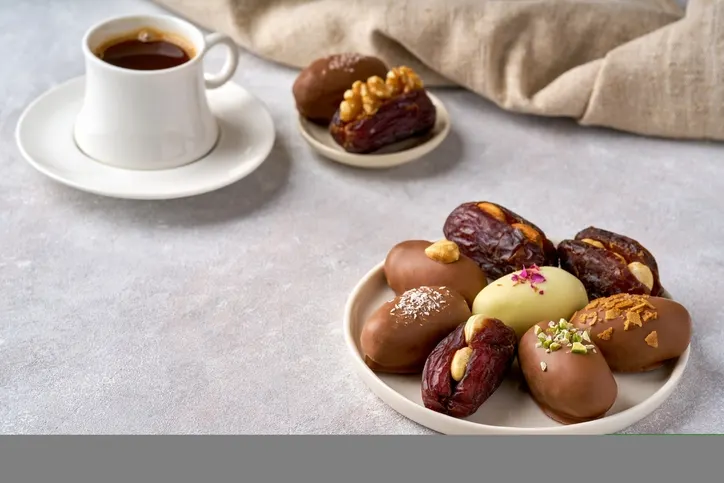
Customize Your Dream Vacation!
Get in touch with our local experts for an unforgettable journey.
Plan Your Trip
Arabic Coffee Rituals in the Majlis
The preparation and serving of Arabic coffee within the majlis represents a sophisticated art form, showcasing the depth of Saudi hospitality through meticulous ritual and tradition.
The traditional preparation process
The Trip of Saudi Arabia coffee begins with lightly roasted Arabica beans, giving the brew its distinctive pale golden color. Traditionally, beans are ground in a metal pestle and mortar, creating rhythmic tapping sounds that often serve as a welcome dawn wake-up call in desert settings. Modern households may opt for electric grinders, but the traditional method persists for its cultural significance.
After grinding, the coffee is boiled with water for several minutes, then cardamom is added—the signature spice in Saudi coffee. The mixture is carefully sieved before being poured into a "dallah," the iconic coffee pot used for serving. This process transforms the simple act of brewing into a deliberate ceremony of hospitality.
Serving etiquette and guest customs
The person serving coffee, known as "Muqahwi," must be at least 15 years old to ensure they can interact gracefully with guests without spilling. The Muqahwi holds the dallah in their left hand and cups ("finjaan") in their right, beginning service with the most respected person present—often a religious scholar or Sheik—before proceeding clockwise.
Guests should accept the cup with their right hand, as using the left is considered improper. When satisfied, a gentle shake of the cup signals completion. The host typically stands throughout this ritual, demonstrating respect and attentiveness.
The role of dates and sweets
Dates invariably accompany Arabic coffee, creating a perfect balance between the coffee's bitterness and the fruit's natural sweetness. This pairing is not merely for taste—it symbolizes the warmth and generosity of Saudi hospitality.
Furthermore, small desserts called "hala qahwa" (literally "coffee dessert") are often served. These bite-sized treats, frequently containing dates, provide protein and fiber—making them ideal for unexpected guests or during Ramadan.
Regional differences in flavor and style
Across Saudi Arabia, coffee preparation varies significantly by region. The central, northern, southern, western, and eastern areas each contribute unique approaches to brewing. Some regions incorporate saffron for color and aroma, others add cloves, cinnamon, or ginger. Nevertheless, freshly ground cardamom remains the common thread uniting these regional variations.
Khawlani coffee from the southern mountains carries specific flavor notes of dried fruit, raisins, dates, and even dark chocolate, creating a distinctive profile that earned UNESCO recognition in 2022.
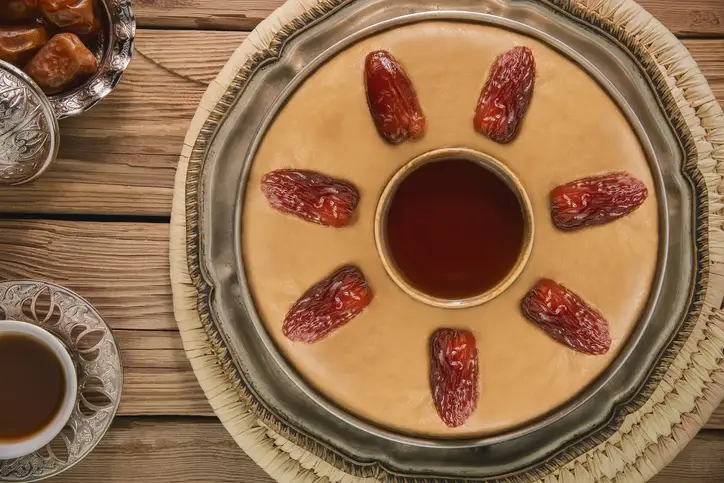
Coffee as a Symbol of Respect and Celebration
Beyond its daily consumption, Arabic coffee serves as a profound symbol in Saudi Arabia's most significant life moments. The presence of a dallah (traditional coffee pot) at gatherings signals not just refreshment, but the deeper values of warmth, readiness, and authentic hospitality.
Coffee in weddings and Eid
Throughout Saudi Arabia, weddings transform into stages where coffee demonstrates social connection. The brew is prepared with extra care—often enhanced with cardamom and saffron—and served in decorative cups matching the event's décor. Attendants dressed in traditional attire serve guests, creating an atmosphere of elegance and cultural heritage.
Eid celebrations likewise center around this cherished beverage. It is customary for Saudi families to gather and break their fast on the first day of Eid el-Fitr with hot coffee. A touching tradition involves wives receiving their husbands and sons returning from Eid prayer with coffee cups, accompanied by baked goods, sweets, and premium dates.
How coffee marks important social moments
Indeed, from weddings and holidays to funerals and daily meetings, coffee plays a vital role in every occasion. More than just a drink, it fosters social cohesion across Saudi society, providing opportunities for social interaction and conversation exchange.
Coffee ceremonies accompany tribal gatherings, particularly those dedicated to reconciliation and conflict resolution. These settings combine coffee consumption with poetry recitation, stimulating discussions, and memory sharing. Through these shared moments around coffee, stories, experiences, and cultural traditions are exchanged, strengthening cultural belonging and understanding.
UNESCO recognition of Saudi coffee
The cultural significance of Saudi coffee received global acknowledgment in 2022 when UNESCO registered Saudi Khawlani coffee and its associated cultivation knowledge to the List of Intangible Cultural Heritage of Humanity. This recognition followed Saudi Arabia's declaration of 2022 as the "Year of Saudi Coffee", launching initiatives to preserve and promote this cultural treasure.
The UNESCO inscription acknowledges how coffee cultivation encourages social cohesion and provides a sense of shared identity, with farmers gathering to exchange knowledge and help others improve their skills. Ultimately, coffee in Saudi culture transcends its role as a beverage to become a powerful symbol of generosity, hospitality, and respect—even acting as a call for peace and dialog within and across countries.
From Tradition to Trend: Coffee in Modern Saudi Life
In urban centers across the Kingdom, a new chapter in Saudi Arabia's coffee story is being written. The beverage that has symbolized hospitality for centuries is now experiencing a renaissance, blending cherished traditions with contemporary global influences.
Rise of specialty cafés
The specialty coffee movement has found fertile ground in Saudi Arabia, with urban development and evolving consumer lifestyles driving significant growth in the café industry. Remarkably, Saudi Arabia's coffee consumption reaches 2.8 kilograms per capita annually—more than double the global average. This surge reflects not merely changing tastes but a cultural evolution.
Specialty coffee shops focus on high-quality beans and artisanal brewing methods, offering Saudi consumers an entirely new coffee experience. Notable cafés like Brew92, Elixir Bunn, and Draft have gained acclaim for their additive-free brews. The government actively supports this trend through initiatives like the Saudi Coffee Company's one-million-square-meter model farm in Jazan, enhancing domestic Arabica bean production.
Blending Gahwa with global coffee culture
Modern cafés cleverly merge tradition with innovation. Many establishments now offer traditional gahwa alongside cappuccinos and cold brews, creating spaces that honor heritage while embracing contemporary trends. This fusion is particularly visible during religious holidays like Eid and Ramadan, when coffee consumption patterns reflect both traditional values and modern preferences.
Cold coffee varieties have gained popularity—a practical adaptation to the region's climate that represents how Saudi coffee culture evolves while maintaining its essence. Consequently, international chains like Starbucks, Costa Coffee, and Tim Hortons have expanded rapidly, with Dunkin' opening 30 stores in a single day in 2022.
How youth are reshaping coffee rituals
Young Saudis stand at the forefront of this coffee revolution. "If you notice, it is mostly the youth surrounding this culture, from the staff to the customers," notes Mariam Hakami, a 22-year-old barista. For younger generations, cafés function as multifunctional venues for socializing, working, and casual meetings.
Vision 2030 has accelerated this transformation by promoting female participation in the hospitality industry, leading to more women working in coffee shops. Subsequently, gender-segregated establishments have become less common. Young coffee professionals increasingly participate in competitions and events, ensuring the continued vibrancy of Saudi Arabia's evolving coffee landscape.
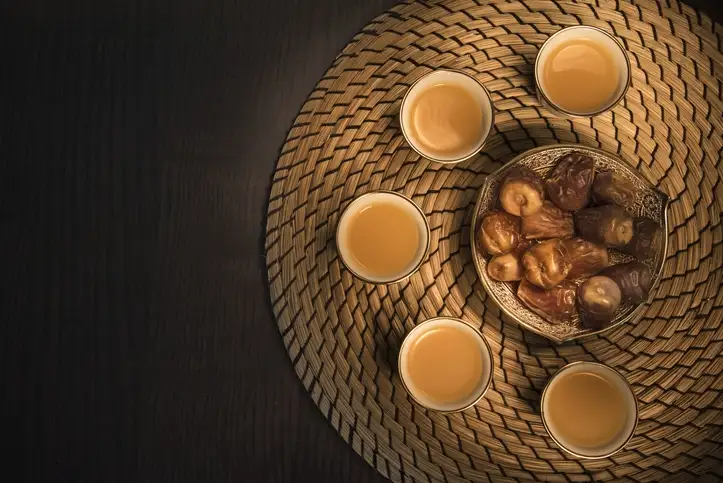
Conclusion
Coffee: A Timeless Thread in Saudi Cultural Fabric
Throughout Saudi Arabia, coffee remains far more than a beverage—it stands as a living testament to centuries of tradition, hospitality, and connection. Your Saudi tour from the mountains of Jazan to modern specialty cafés illustrates how deeply coffee has permeated Saudi identity, adapting yet persisting through generations of change.
Coffee rituals within the majlis continue to serve as powerful expressions of generosity and respect. The meticulous preparation process, the careful pouring from dallah to finjaan, and the rhythmic passing of cups all embody values that define Saudi social bonds. Certainly, these practices have evolved over time, yet their essence remains remarkably intact.
UNESCO's recognition of Khawlani coffee underscores what Saudis have always known—this tradition carries profound cultural weight. The coffee ceremony represents wisdom passed between generations, unity during celebrations, and comfort during times of mourning. Additionally, the pairing with dates creates a harmony that symbolizes the perfect balance of bitter and sweet experiences life offers.
Young Saudis now write the next chapter of this rich narrative. Their innovative approaches blend reverence for tradition with contemporary sensibilities, therefore ensuring coffee culture remains relevant and vibrant. Specialty cafés throughout the Kingdom demonstrate how Saudi coffee traditions can flourish alongside global influences without losing their distinct character.
Saudi coffee tells many stories—of hospitality shown to travelers crossing harsh deserts, of wisdom shared between elders and youth, of reconciliation between conflicting parties, and of celebration during life's most precious moments. This golden brew ultimately represents something profoundly human: our need to connect, share, and welcome one another despite our differences.
After all, perhaps the true magic of Saudi coffee lies not in its preparation or taste alone but in how a simple cup creates spaces where people truly see each other—a tradition worth preserving for countless generations to come.
FAQs
1. What is a majlis and why is it important in Saudi culture?
A majlis is a traditional gathering space in Saudi homes that serves as the heart of hospitality. It's important because it's where people come together to discuss issues, celebrate events, and pass down cultural traditions, fostering community bonds and social cohesion.
2. How is Arabic coffee prepared and served in Saudi Arabia?
Arabic coffee in Saudi Arabia is prepared using lightly roasted Arabica beans, ground and boiled with water and cardamom. It's served from a special pot called a dallah into small cups (finjaan), following specific etiquette that reflects respect and hospitality.
3. What role does coffee play in Saudi celebrations and social events?
Coffee plays a central role in Saudi celebrations like weddings and Eid, symbolizing warmth and generosity. It's also essential in daily social interactions, conflict resolution, and important gatherings, serving as a medium for strengthening relationships and cultural bonds.
4. How has Saudi coffee culture evolved in modern times?
Saudi coffee culture has evolved with the rise of specialty cafés, blending traditional gahwa with global coffee trends. Young Saudis are reshaping coffee rituals, embracing new brewing methods and flavors while still honoring cultural heritage.
5. What is the significance of UNESCO recognizing Saudi coffee?
UNESCO's recognition of Saudi Khawlani coffee as Intangible Cultural Heritage highlights its importance in fostering social cohesion and shared identity. This acknowledgment emphasizes coffee's role in Saudi culture as more than just a beverage, but as a symbol of generosity, hospitality, and respect.
There are Many More Things to Do in Saudi Arabia, Plan Memorable Saudi Arabia Tours!
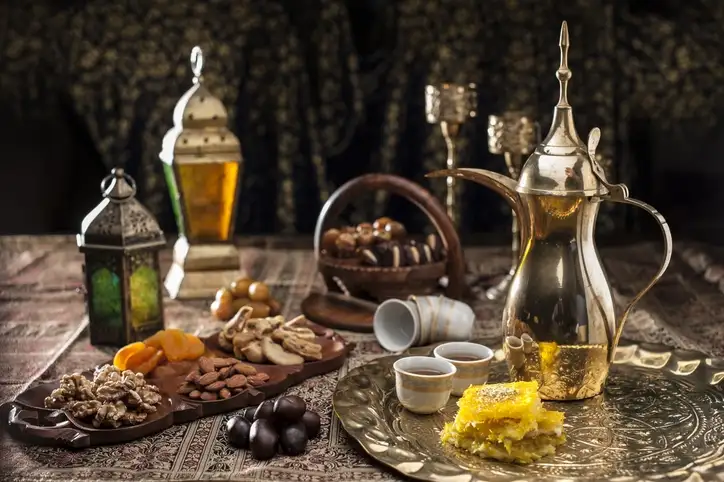
Related Articles
Keep the inspiration going with these handpicked travel reads.
